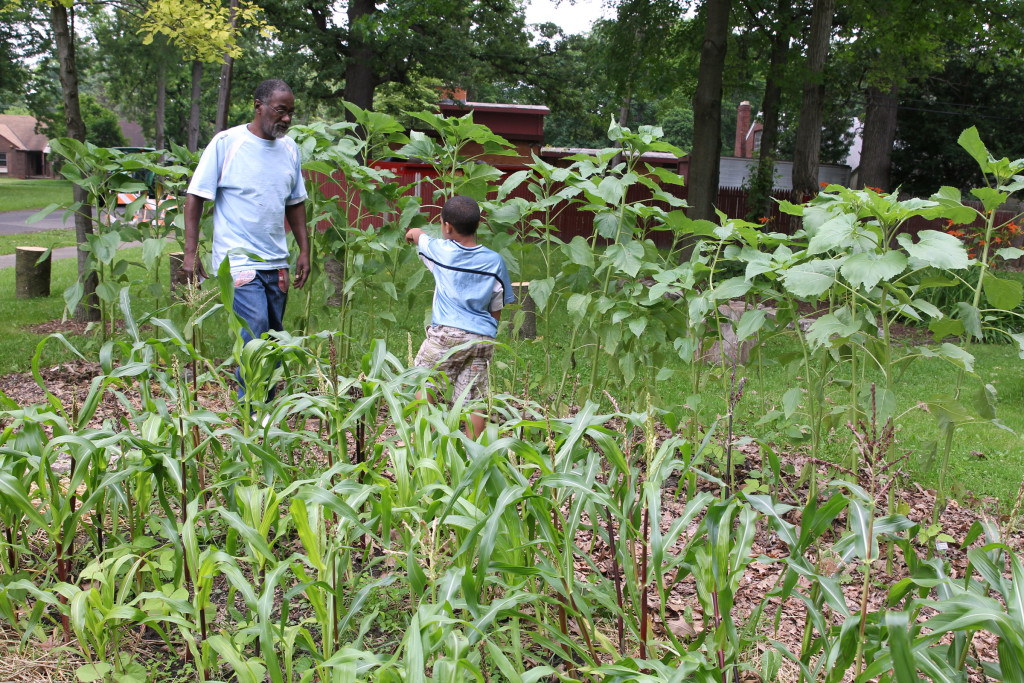
Abdul Malone, 62, and his son, Ahmad, 6, walk through the vegetable garden at Hope House in Deteroit’s Brightmoor neighborhood June 30. Both volunteer with Voices for Earth Justice, an interfaith urban garden program in partnership with the Dominican sisters of Adrian, Michigan. (CNS photo/Dennis Sadowski) See DOMINICANS-GROW and RELIGIOUS-ENVIRONMENT July 8, 2015.
by Dennis Sadowski
WASHINGTON (CNS) — Long before Pope Francis’ encyclical “Laudato Si'” that ties care for earth with care for humanity was promulgated, congregations of women religious were stepping out to protect creation.
Inspired by the call of the Second Vatican Council to engage the world and biblical passages on the beauty of God’s world, members of religious congregations began considering as early as the 1970s how human life affected the planet and set out on a path that included education and practical actions with the goal of connecting more deeply with the natural world.
From opening small-scale environmental centers to a summer program teaching kids to build an alternative energy system that uses a bike to charge a cellphone, women religious are charting a new path to the future, one based, they say, on a spiritual connection with creation.
Representatives of several congregations told Catholic News Service their actions serve as an example for others, Catholic or non-Catholic. And they welcomed Pope Francis’ teaching in his recent encyclical, citing a “new language” that hopefully will inspire people to better understand their relationship with the world.
In Park City, Utah, just outside of Salt Lake City, a group of 10-year olds this summer is learning about energy. Holy Cross Sister Mary Ann Pajakowski, who oversees the summer program, told CNS the kids are converting the bike so it can generate electricity.
“We wanted to do something educational with the kids. One of the things they really like to do is ride bikes. We thought, ‘Let’s see how to build a project around alternative energy and generate power with a bike,'” Sister Mary Ann, director of Holy Cross Ministries, explained about the program partnering with the Park City School District.
The kids come primarily from Latino families who work in service jobs in upscale Park City, which is noted for its skiing in winter and tourism in summer. Sister Mary Ann said the children have few opportunities to learn about the environment and that the Holy Cross Ministries helps the youngsters become more aware of their natural surroundings.
The alternative energy program is funded by the Sisters of the Holy Cross of Notre Dame, Indiana, through their Carbon Footprint Reduction Fund, which was established to support projects that reduce carbon pollution. The fund as well as other initiatives extend from the order’s corporate stance expressing a desire to better care for the environment.
Holy Cross Sister Mary Turgi, director of her order’s International Justice Office, told CNS the corporate stance developed out of an understanding that humanity has been “in the midst of really undermining and possibly destroying creation, which is a magnificent gift from God.”
The order, with members serving in Africa, South America, Asia, Mexico and Canada, is making connections with the negative impacts of climate change on people around the world that stem from the consumer-driven life in the developed world, Sister Mary said.
“You look around at your own experience and see what’s happening to people around the world and say, ‘This is not right,'” she continued. “It’s a moral problem. As Francis has said we have a moral obligation to address this. It’s not an option. We need to do it.”
Many religious congregations in the U.S. and Canada have taken similar corporate stances on the environment and protecting the earth that are in line with the Catholic Church’s teaching. Steps have been as simple as instituting composting and recycling programs, purchasing hybrid vehicles and installing more efficient heating and cooling systems and as involved as rethinking investment practices and land management.
The Dominican sisters of Adrian, Michigan, in 2011 committed to introducing permaculture practices on about 10 percent their property. The Sisters of Charity of Nazareth, Kentucky, called access to clean water a fundamental human right and has worked to protect water sources since 2007. And in Canada, the Congregation of Notre Dame committed two of its members to establish a 14-acre farm in Nova Scotia.
Representatives of several congregations said such steps are grounded in a deep spirituality that grows from Scripture in understanding that humans must be responsible for all life, especially humanity, on the planet.
“From the beginning (in 1812) we have tried to respect the earth and care for it,” said Sister Brenda Gonzalez, vice president of the order.
“Our urgency is to see how we can be a more responsible consumer. The land is a gift that we’ve received, that we do not feel entitled to everything,” Sister Brenda explained.
Along those lines, members of the order played a leading role in a two-year campaign to block the proposed Bluegrass Pipeline that would have carried liquid natural gas byproducts from Pennsylvania and Ohio to the Gulf Coast. Their concern focused on potential leaks and threats to underground aquifers and the fragile karst topography of northern Kentucky. The order itself prevented surveyors plotting possible routes from entering their property. The two companies leading the effort announced in December that the project was indefinitely on hold.
“Our stance is based in Scripture,” Sister Brenda said. “We’ve come to realize it’s not ours. It’s God’s.”
In Three Brooks, Nova Scotia, Sister Mary Corbett and Sister Rebecca McKenna established a ministry of presence in 2011 on a 14-acre farm known as The Small Plot, after their religious community, the Congregation of Notre Dame in Montreal, approved of the measure.
Sister Rebecca told CNS launching the farm was a response to “serve the cause of God” in response to recognizing “the cry of Earth itself.”
“It originated out of the growing awareness of many sisters in the province which culminate around concern about environmental issues, wanting to widen the circle of our compassion and care from the human community to the entire planet,” she explained.
The program is more than growing food and living on the land. The two Notre Dame sisters have introduced a weekly ecumenical gathering for meditation, developed community gardens with their rural neighbors and teach about scriptural references to the environment.
“I see that we want to be part of the great turning and how to live in the new wilds. Things are breaking down in terms of the energy crisis and water in so many places becoming commodities. It’s just against everything we (as church) believe,” Sister Rebecca said.
“So we hope to be a symbol and sign.”






